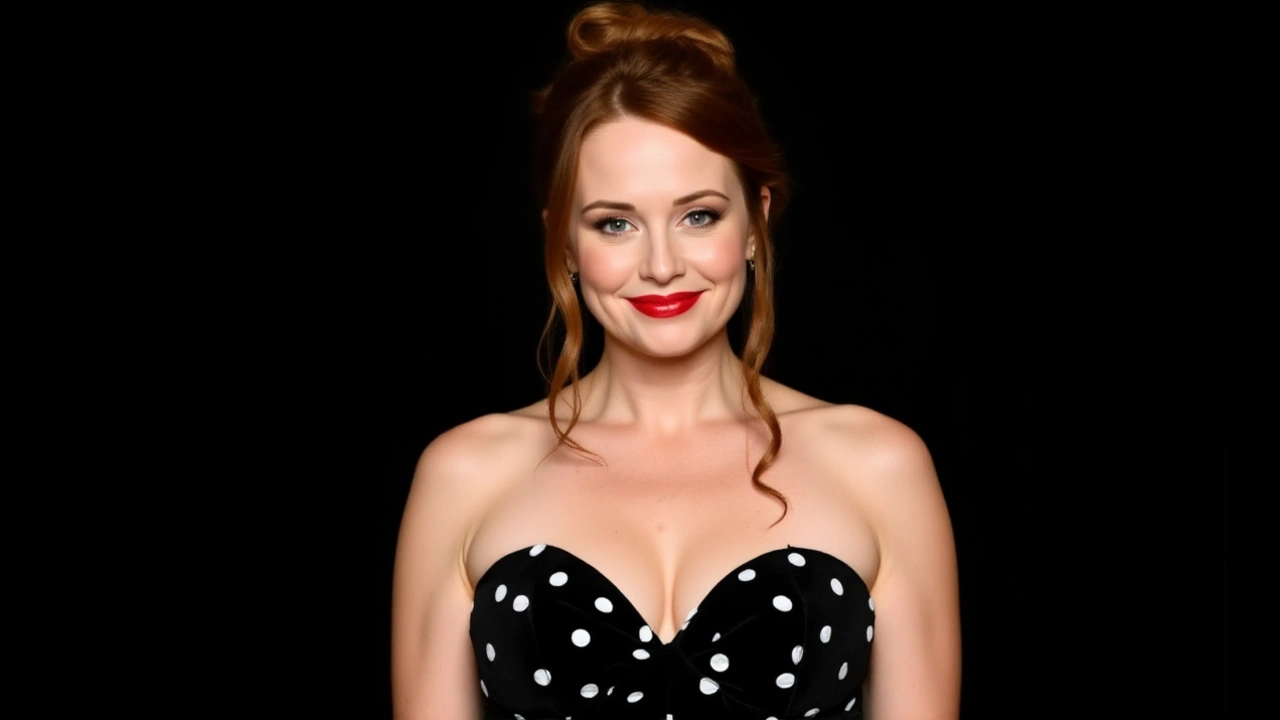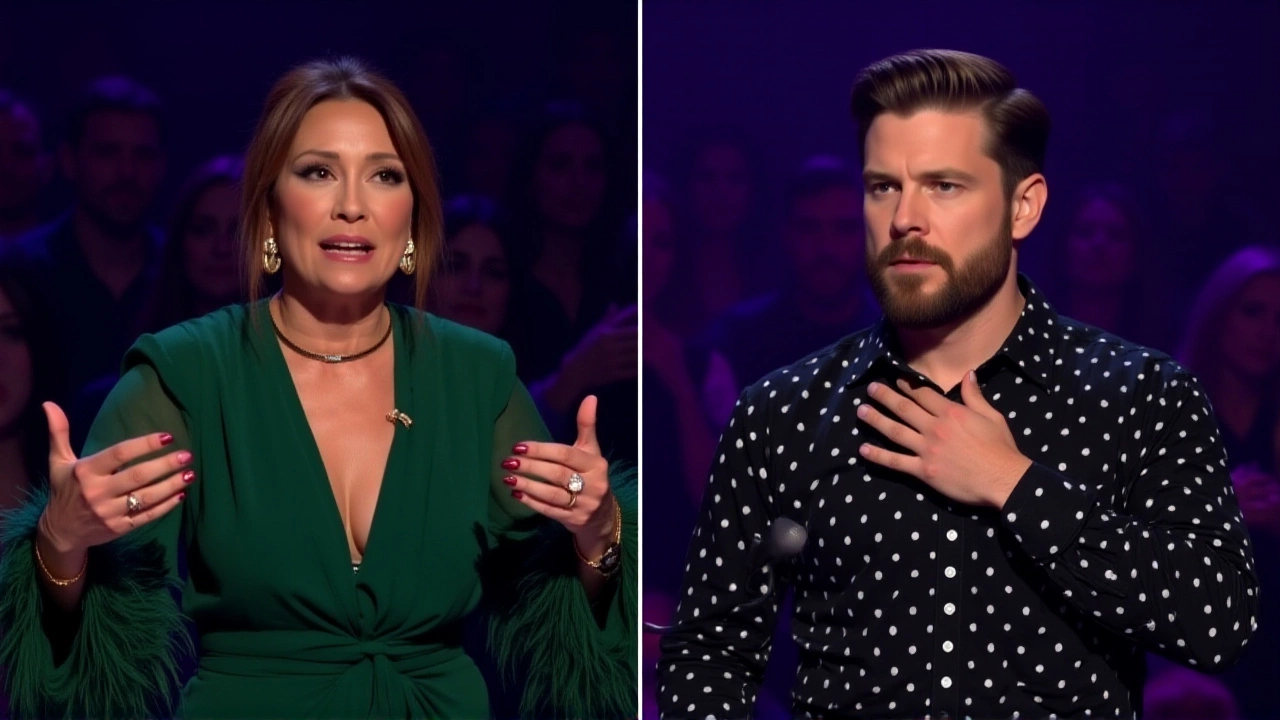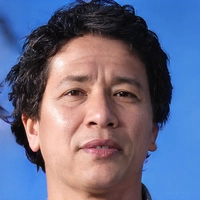During a live broadcast of Dancing With The Stars last week, longtime judge Derek Hough openly questioned the feedback given by fellow judge Carrie Ann Inaba about contestant Whitney Leavitt—a rare on-air moment that sent shockwaves through the show’s fanbase. The exchange, captured in multiple viral social media clips, wasn’t a heated argument, but something more subtle—and for viewers, more telling. Hough, visibly puzzled, leaned into the camera after Inaba’s critique and said, in effect, ‘I’m not sure I follow that.’ The moment didn’t end there. Fans quickly noticed his body language: a pause, a raised eyebrow, a slight shake of the head. It wasn’t anger. It was confusion. And that’s what made it stick.
What Exactly Did Carrie Ann Say?
The trigger was Inaba’s critique of Whitney Leavitt’s Viennese Waltz, a dance that demands grace, precision, and emotional connection. Inaba pointed to Leavitt’s ‘lack of intention’ and ‘over-reliance on technique,’ suggesting the performance felt mechanical. Hough, known for his deep appreciation of artistry over rigid form, clearly saw it differently. He’s danced with Olympic-level ballroom champions. He’s coached contestants to win by helping them find the soul behind the steps. To him, Leavitt’s emotional vulnerability—her trembling hands, her eyes locked on her partner—wasn’t a flaw. It was authenticity. And that’s what he couldn’t reconcile with Inaba’s assessment.
There’s no transcript of the exchange, no official statement from ABC. But the YouTube Short titled ‘Derek Hough Clashes With Carrie Ann Inaba During DWTS’ captured the moment perfectly: ‘He was very confused by her comments about Whitney Leavitt.’ That’s it. No yelling. No interruption. Just quiet disbelief. And that’s what made it feel real.
A History of Judge Dynamics on DWTS
Judge disagreements aren’t new on Dancing With The Stars. In Season 17, Len Goodman famously clashed with Inaba over a contestant’s ‘too aggressive’ performance. In Season 22, Bruno Tonioli and Inaba had a public rift over a jazz routine that left viewers divided. But those were professional differences—often resolved backstage. This time, it happened live. On air. And Hough didn’t just disagree—he looked genuinely unsettled.
Hough, who joined the judging panel in 2014 after winning the show twice as a pro dancer, has always been seen as the most emotionally attuned judge. He doesn’t just score technique—he scores heart. Inaba, a former Broadway performer and choreographer, tends to prioritize structure and polish. Their styles have always differed, but rarely has that difference played out so visibly.

Why Fans Are Watching Closely
On Instagram, the reel with the caption ‘Derek Hough did not hold back on Dancing With the Stars this week...’ has over 1.2 million views. Comments flood in: ‘I’ve never seen Derek look so lost,’ ‘Carrie Ann needs to stop being so clinical,’ ‘Whitney deserved better.’ The hashtag #derekhough trended nationally for 14 hours. What’s interesting isn’t just the disagreement—it’s how invested fans are in the judges’ chemistry. For many, Dancing With The Stars isn’t just a competition. It’s a family drama with sequins.
And now, with Leavitt still in the competition, the stakes are higher. Will Inaba’s critique influence future scoring? Will Hough push back again? Will producers edit out the tension—or lean into it? The show’s producers have remained silent, but insiders tell Entertainment Weekly that the incident was ‘unscripted and unedited,’ meaning it wasn’t manufactured for ratings. That makes it more powerful.
What This Means for Whitney Leavitt
Whitney Leavitt, a 28-year-old former college dance captain from Atlanta, has been praised for her raw, unfiltered performances. She’s not the most technically perfect dancer on the floor—but she’s the one who makes people cry. If Hough’s confusion signals a deeper divide among the judges, it could mean Leavitt’s path forward gets harder. Judges who disagree publicly often create a scoring imbalance. One judge sees soul; another sees mistakes. And in a competition where a single point can eliminate someone, that matters.
Leavitt hasn’t spoken publicly about the incident. But her partner, pro dancer Gleb Savchenko, posted a quiet message on his Instagram: ‘Keep dancing like you mean it.’ That’s all she needs to hear.

What’s Next?
The next episode of Dancing With The Stars airs Tuesday night. If the tension continues, expect more awkward silences, more glances between judges, and possibly even a rare moment where Hough asks for a re-dance—or even a re-score. Producers may try to smooth things over with a ‘judges’ roundtable’ segment next week. But fans won’t forget this. Not anytime soon.
For now, the real question isn’t whether Leavitt will stay in the competition. It’s whether Hough and Inaba can find common ground—or if this is the beginning of something bigger.
Frequently Asked Questions
Why did Derek Hough seem so confused by Carrie Ann Inaba’s comments?
Hough, known for valuing emotional authenticity in dance, interpreted Whitney Leavitt’s vulnerability as strength, while Inaba criticized her performance as overly technical and lacking intention. This fundamental difference in judging philosophy—artistry vs. precision—left Hough visibly unsettled, as he couldn’t reconcile how the same performance could be seen as flawed rather than moving.
Has this kind of judge conflict happened before on DWTS?
Yes, but rarely this openly. In Season 17, Len Goodman and Inaba clashed over a contestant’s style, and in Season 22, Bruno Tonioli and Inaba had a public disagreement. But those were resolved privately. This time, Hough’s reaction was unscripted and visible on live TV, making it feel more personal—and more significant—to viewers.
Is there any official response from ABC or the DWTS producers?
No official statement has been released. However, insiders confirmed to Entertainment Weekly that the exchange was completely unscripted and unedited, suggesting producers didn’t orchestrate the moment. That authenticity is likely why it went viral—fans sensed it was real, not staged for drama.
How might this affect Whitney Leavitt’s chances in the competition?
If the judges remain divided, Leavitt could face inconsistent scoring—high marks from Hough, lower ones from Inaba and possibly others. In past seasons, such splits have led to unexpected eliminations. But her emotional connection with viewers has already made her a fan favorite, which could help her survive even if judges are split.
What’s the significance of the social media reaction?
The viral clips—especially the YouTube Short and Instagram Reels—show that audiences are no longer passive viewers. They’re analyzing judge behavior, debating judging criteria, and forming opinions based on subtle cues. This incident proves that DWTS fans now treat the judges like characters in a serialized drama, not just scorekeepers.
Could this lead to a permanent rift between Hough and Inaba?
Unlikely. Both are professionals who’ve worked together for nearly a decade. But if similar moments occur, especially with other contestants, it could shift the show’s tone. Viewers may start expecting more debate—and producers might encourage it to boost engagement. For now, it’s a moment, not a movement.

